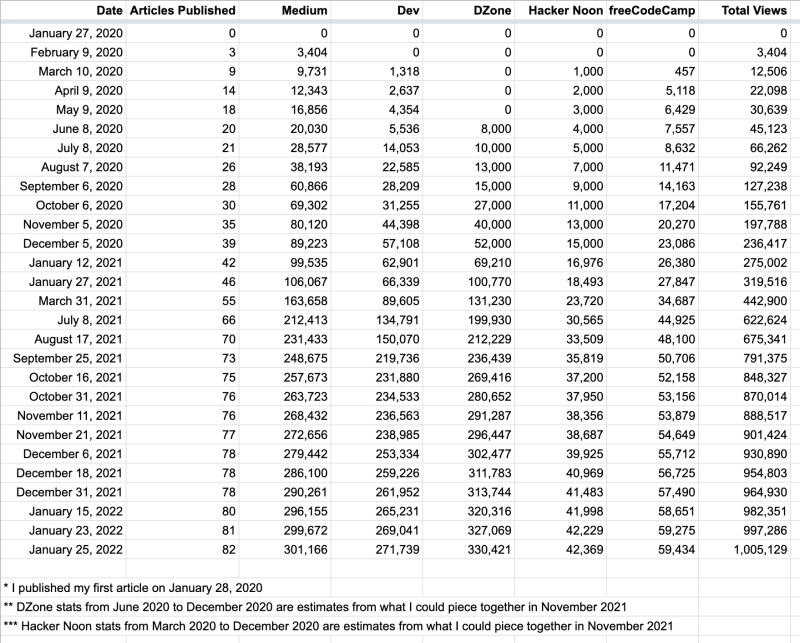After two years of writing, I hit one million article views. This was a big milestone I’ve patiently looked forward to since the day I began writing.
Was it worth the wait? Yes and no. I’d like to take this time to reflect on the last two years, why I write, and why achieving your goals isn’t as exciting as you may think.
The Journey: Then and Now
I started writing almost on a whim back in January 2020. I’ve always enjoyed teaching and presenting, so writing seemed to be a natural extension of that passion. Teaching a group of 100 engineers is fun, but why not 100,000 engineers? Writing allows you to reach an audience outside of your normal social circle.
When I began writing, I anxiously checked my stats every day. I celebrated the small wins of gaining one new follower or having 100 people read an article. As you can imagine, the first few months were slow going.
You can see below some detailed statistics that I tracked over the last two years. I publish on a variety of platforms, and all of them provide analytics on how your articles are doing. I combined those into my own spreadsheet to create some charts from there.
Here’s the resulting chart:
And here’s the data fueling that chart:
I published my first article on January 28, 2020. I hit one million views on January 25, 2022, just three days before my two-year writing anniversary.
The exciting part to me is the exponential growth. Rather than a straight line, you see a curve. And that makes sense, because as time goes on, you have more articles written and more followers reading your work.
If you’re a new writer, I hope this data provides you with a somewhat realistic view into the writing world. Don’t expect to go viral on day one. It takes time, hard work, and consistency to build a solid foundation.
Success Can Be Disappointing
I achieved my milestone of one million views. Now what? What’s next? Two million views?
The problem with being goal driven is that you live most of your life in a state of frustration. While pursuing a goal, you haven’t yet achieved it. And once you’ve achieved your goal, what do you do next? Well, you set another goal and begin pursuing that. The moments of success are short and fleeting.
That’s why most people are surprised to find that they feel empty once they’ve achieved their goal. You’ve put all this hard work in, and for what? A short celebration and then the feeling of, “Now what?”
When the long jumper Robert Beamon competed in the 1968 Olympic Games, the current world record for the long jump was 27 feet, 4 ¾ inches. His jump: 29 feet, 2 ½ inches. He crushed the record by nearly two feet! You would think he would have been ecstatic, and he was — but only for a little bit. In a later interview, he recounts: “When I got to the medal stand, I said, ‘what am I gonna do? I’ve reached one stage, and so what is the next peak experience in my life?’” He shortly thereafter enrolled in a master’s degree program studying sociology and slowly faded out of the athletic sphere (Irresistible, Adam Alter, page 100).
As a less dramatic example, think of the fish in the tank at the dentist’s office in Finding Nemo. They spend every waking minute of their days planning their escape to the ocean. In the end credits scene, they succeed, crossing a busy street and landing in the ocean. Then, as they sit bobbing in the ocean water for a moment, one of the fish says, “…Now what?”.
Focus on Systems Not Goals
It’s this problem with being goal driven that is difficult for ambitious people to overcome. You can live your life as a series of milestones, achieving goal after goal. But there will always be something else, something more. More followers, more fame, more money.
That’s why it’s essential to focus on systems and not on goals. A goal is a specific milestone, something that you achieve. A system, on the other hand, is something that you do. It’s a process.
Rather than focusing on a specific number of followers or views, it’s important to focus on the process itself. Why do you do what you do, and how can you make it sustainable without endlessly running the rat race?
Why I Write
I write because I enjoy it. It provides a medium for me to clarify my thoughts and to present them to others. It allows me to teach, which I find fulfilling.
Professionally, writing has opened many opportunities for me. I’ve met hundreds of interesting new people. I’ve been offered freelance writing contracts on dozens of interesting topics and technologies. I’ve been interviewed as a guest on several podcasts. It’s even opened up some speaking opportunities for me.
Writing is far less about the number of article views or followers I have. Instead, it’s about doing what I want to do with my life.





















